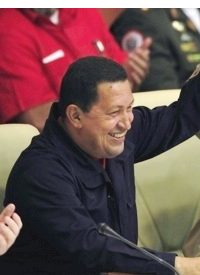
Hugo Chavez, the brutal Marxist leader of Venezuela, has faced a rocky road in his effort to emulate the career of Fidel Castro. The Venezuelan middle class, opposition newspapers and radio stations, and political groups accustomed to the nation’s tradition of democracy have all resisted the tentacles of his octopus, dealing stinging rebukes to his claim to represent all the people of Venezuela.
His latest strong-arm move was ordering the expropriation of six residential apartment buildings and the temporary occupation of eight gated communities in the capital city of Caracas and other Venezuelan cities, pronouncing this deed “an act of justice.”
The fig leaf for these actions is allegations that construction and real estate firms were cheating the residents. Civil courts, of course, provide recourse for any actual misconduct by these private companies. Indeed, the middle-class dwellers who were allegedly wronged strongly rejected the president’s use of soldiers and edicts to resolve any “injustices” done them, stating that their relationships with builders and real estate companies generally had been fair and honest.
Perhaps the real reason for Chavez’s actions came out in a telephone interview with state-run television during his recent visit to Havana. In that interview he alleged that some construction and real estate firms were helping to fund his political opposition, although he provided no details. Venezuela, which long enjoyed one of the healthiest climates in Latin America of ordered liberty and the rule of law, does not prohibit its citizens from supporting opponents of the government. Such action is outlawed in the gulag of Cuba — a country Chavez seems determined to use as a model for his homeland.
After years of ruling Venezuela with an iron fist, Chavez and his United Socialist Party suffered a stunning defeat in the September 26 elections. The principal opposition party, the Coalition for Democratic Unity, received about 47 percent of the vote in parliamentary elections while Chavez’s socialists garnered only about 48 percent. Though the vote was split approximately equally, according to Wikipedia:
The Coalition won a majority of the first-to-the-post votes, consequently retaining a substantial majority in the National Assembly.
Opposition to this Castro-aspirant has not died, and in fact seems quite resilient, in spite of thuggish tactics such as his latest move to expropriate and temporarily occupy apartments and homes of the middle class. Perhaps such opposition presages the beginning of a return to law and liberty in that beleaguered land.
Photo: Venezuela’s President Hugo Chavez during a meeting with Cuba’s President Raul Castro (out of picture) in Havana, Cuba, Nov. 8, 2010: AP Images



